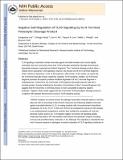Negative Self-Regulation of TLR9 Signaling by Its N-Terminal Proteolytic Cleavage Product
Author(s)
Ploegh, Hidde; Lee, Sungwook; Kang, Dongju; Ra, Eun A.; Lee, Taeyun A.; Park, Boyoun; ... Show more Show less
DownloadPloegh_Negative self-regulation.pdf (1.360Mb)
OPEN_ACCESS_POLICY
Open Access Policy
Creative Commons Attribution-Noncommercial-Share Alike
Terms of use
Metadata
Show full item recordAbstract
TLR signaling is essential to innate immunity against microbial invaders and must be tightly controlled. We have previously shown that TLR9 undergoes proteolytic cleavage processing by lysosomal proteases to generate two distinct fragments. The C-terminal cleavage product plays a critical role in activating TLR9 signaling; however, the precise role of the N-terminal fragment, which remains in lysosomes, in the TLR9 response is still unclear. In this article, we report that the N-terminal cleavage product negatively regulates TLR9 signaling. Notably, the N-terminal fragment promotes the aspartic protease-mediated degradation of the C-terminal fragment in endolysosomes. Furthermore, the N-terminal TLR9 fragment physically interacts with the C-terminal product, thereby inhibiting the formation of homodimers of the C-terminal fragment; this suggests that the monomeric C-terminal product is more susceptible to attack by aspartic proteases. Together, these results suggest that the N-terminal TLR9 proteolytic cleavage product is a negative self-regulator that prevents excessive TLR9 signaling activity.
Date issued
2014-09Department
Massachusetts Institute of Technology. Department of Biology; Whitehead Institute for Biomedical ResearchJournal
Journal of Immunology
Publisher
American Association of Immunologists
Citation
Lee, S., D. Kang, E. A. Ra, T. A. Lee, H. L. Ploegh, and B. Park. “Negative Self-Regulation of TLR9 Signaling by Its N-Terminal Proteolytic Cleavage Product.” The Journal of Immunology 193, no. 7 (September 3, 2014): 3726–3735.
Version: Author's final manuscript
ISSN
0022-1767
1550-6606